Resignation Letter Due to Changes in the Company
[Your Name]
[Your Address]
[City, State, Zip Code]
[Email Address]
[Phone Number]
[Today's Date]
[Recipient's Name]
[Company Name]
[Company Address]
[City, State, Zip Code]
Dear [Recipient's Name],
I hope this letter finds you well. I am writing to formally submit my resignation from my position as [Your Job Title] at [Company Name]. My last day of employment will be [Last Working Day], providing a notice period of [Notice Period, e.g., two weeks] in accordance with the terms of my employment contract.
This decision has not been an easy one for me to make, as I have thoroughly enjoyed my time at [Company Name]. Over the course of my employment, I have had the privilege of working with exceptional colleagues and contributing to the growth and success of the company.
However, recent changes within the company have led to a shift in the overall work environment and organizational structure. These changes have impacted the nature of my role and the responsibilities associated with it. Regrettably, I find that my current position no longer aligns with my professional aspirations and career goals.
I want to express my sincere gratitude to the entire [Company Name] team for the support, encouragement, and opportunities provided to me during my tenure here. I have learned valuable skills and gained invaluable experiences that will undoubtedly shape my future endeavors positively.
During my notice period, I am committed to ensuring a smooth transition of my tasks and responsibilities. I am more than willing to assist in training and onboarding my successor to ensure a seamless handover.
Please let me know if there are any specific procedures or tasks that I need to follow during the notice period. I am open to discussions about this matter to ensure a successful transition.
I wish [Company Name] continued success and growth in the future. Please keep in touch, and I hope our paths cross again.
Thank you once again for everything.
Sincerely,
[Your Name]
Professional Resignation Due to Organizational Restructuring
Subject: Resignation - [Your Name]
Dear [Manager's Name],
I am writing to formally notify you of my resignation from my position as [Job Title] at [Company Name]. My last day of work will be [Date - typically two weeks from submission].
This decision comes following the recent organizational restructuring and changes in company direction that have significantly altered my role and responsibilities. While I understand that change is a natural part of business evolution, I have determined that these modifications are not aligned with my career goals and professional aspirations.
I want to express my gratitude for the opportunities I have had during my tenure here. I have gained valuable experience and developed meaningful professional relationships that I will carry forward in my career.
During my remaining time, I am committed to ensuring a smooth transition. I will complete all current projects to the best of my ability and will assist in training my replacement or transferring responsibilities as needed.
Thank you for your understanding. I wish you and the company continued success.
Sincerely,
[Your Name]
[Your Contact Information]
Heartfelt Email Due to Cultural Changes
Subject: My Resignation - A Difficult Decision
Dear [Manager's Name],
It is with a heavy heart that I submit my resignation from my position as [Job Title], effective [Date].
The recent changes in company culture and values have created an environment that no longer feels like the workplace I once knew and loved. The shift away from [specific value/practice] and toward [new direction] has made it increasingly difficult for me to perform my duties with the same passion and commitment that I've always brought to this role.
This was not an easy decision. I have spent [time period] building relationships and contributing to projects that I deeply care about. However, I believe it's important to work in an environment where my values align with the organization's direction.
I am grateful for the mentorship, friendships, and professional growth I've experienced here. These experiences have shaped me both personally and professionally, and I will always cherish the memories we've created together.
I am committed to making this transition as seamless as possible and will work diligently over the next two weeks to wrap up my responsibilities.
With sincere appreciation and best wishes for the future,
[Your Name]
Formal Letter Due to Management Changes
Subject: Notice of Resignation
Dear [HR Director/Manager's Name],
Please accept this letter as my formal notice of resignation from my position as [Job Title] with [Company Name]. My final day of employment will be [Date].
The recent changes in management structure and leadership philosophy have resulted in a work environment that differs substantially from the one I originally joined. The new management approach and strategic direction are incompatible with my professional working style and career objectives.
I have thoroughly considered this decision and believe it is in the best interest of both myself and the organization for me to pursue opportunities elsewhere that better align with my professional standards and expectations.
I will ensure that all my current responsibilities are completed or properly transferred during my notice period. I am prepared to assist with the transition process and training of my replacement to minimize any disruption to ongoing operations.
I appreciate the opportunities for professional development that I have received during my employment and wish the company success in its future endeavors.
Respectfully,
[Your Name]
[Date]
Quick Email Due to Policy Changes
Subject: Resignation Notice - [Your Name]
Hi [Manager's Name],
I'm writing to inform you that I will be resigning from my position as [Job Title], effective [Date].
The recent policy changes, particularly regarding [specific policy], have created working conditions that I cannot continue to operate under. These changes conflict with my professional principles and make it impossible for me to perform my role effectively.
I'll work with you over the next two weeks to ensure a smooth handover of my responsibilities.
Thanks for the opportunities I've had here.
Best regards,
[Your Name]
Professional Message Due to Budget Cuts and Layoffs
Subject: Voluntary Resignation - [Your Name]
Dear [Manager's Name],
Given the recent budget cuts and the unfortunate layoffs that have affected our team, I have decided to submit my resignation from my position as [Job Title]. My last day will be [Date].
I understand the difficult financial position the company is facing, and I respect the tough decisions that management has had to make. However, the reduced resources, increased workload expectations, and uncertainty about future stability have led me to seek a more secure position elsewhere.
I want to emphasize that this decision is purely professional and in no way reflects my feelings toward my colleagues or the work we've accomplished together. I have great respect for this organization and the people who work here.
I will do everything possible to complete my current projects and assist with the transition during my remaining time.
Thank you for your understanding during this challenging period.
Professional regards,
[Your Name]
Serious Letter Due to Ethical Concerns
Subject: Resignation Due to Ethical Concerns
Dear [Manager's Name],
After careful consideration, I am submitting my resignation from my position as [Job Title], effective [Date].
The recent changes in company practices and decision-making processes have created ethical dilemmas that I cannot reconcile with my personal and professional values. I have observed shifts in [specific area] that compromise the integrity standards I believe are essential in our industry.
I have attempted to address these concerns through appropriate channels, but the persistence of these issues has made it clear that I cannot continue in my current role while maintaining my professional integrity.
This decision was not made lightly, as I have invested considerable time and effort in my work here. However, I must prioritize my ethical obligations and professional reputation.
I will complete my current assignments and ensure proper documentation of all ongoing projects during my notice period.
I wish you and the company well, with hopes that future decisions will reflect the high standards that originally attracted me to this organization.
Sincerely,
[Your Name]
Casual Email Due to Work-Life Balance Changes
Subject: My Resignation
Hey [Manager's Name],
I hope you're doing well. I wanted to let you know that I've decided to resign from my position as [Job Title]. My last day will be [Date].
The recent changes in work expectations and the shift toward [specific change] have made it really challenging for me to maintain the work-life balance that's important to my well-being. With the new demands and extended hours becoming the norm, I've realized this isn't sustainable for me long-term.
I've really enjoyed working with the team and appreciate all the support you've given me. The experience I've gained here has been invaluable, and I'm grateful for that.
I'll make sure to wrap up everything on my plate and help with the transition however I can over the next couple of weeks.
Thanks for everything, and I hope we can stay in touch!
Best,
[Your Name]
What is a Resignation Letter Due to Changes in the Company
A resignation letter due to changes in the company is a formal document that employees submit when they decide to leave their position as a direct result of organizational modifications. These changes can include restructuring, policy updates, management shifts, cultural transformations, budget cuts, or strategic pivots that make the work environment unsuitable for the employee. The letter serves as official documentation of the employee's departure while clearly communicating that the decision was triggered by specific company changes rather than personal dissatisfaction or external opportunities.
When Should You Send This Type of Resignation Letter
- Following major organizational restructuring that eliminates or significantly alters your role
- After leadership changes that result in conflicting management styles or unrealistic expectations
- When new company policies contradict your professional values or working preferences
- Following budget cuts that increase workload beyond manageable levels or eliminate essential resources
- After cultural shifts that create a toxic or incompatible work environment
- When ethical concerns arise from new business practices or decision-making processes
- Following mergers or acquisitions that fundamentally change job responsibilities or company direction
- When work-life balance expectations change dramatically due to new operational requirements
- After compensation or benefits are reduced as part of cost-cutting measures
- When promised career development opportunities are eliminated or postponed indefinitely
Who Should Send This Letter
- Long-term employees who have witnessed significant organizational transformation
- Specialists whose roles have been eliminated or merged into incompatible positions
- Managers who disagree with new leadership directives or strategic decisions
- Employees whose departments have been restructured or outsourced
- Workers who can no longer perform effectively under new policies or procedures
- Professionals whose values conflict with recent changes in company culture or ethics
- Team members affected by budget cuts that compromise their ability to do quality work
- Employees who joined the company for specific benefits, culture, or opportunities that no longer exist
- Anyone who has attempted to adapt to changes but finds them fundamentally incompatible with their career goals
To Whom Should This Letter Be Addressed
- Direct supervisor or immediate manager as the primary recipient
- Human Resources department for official record-keeping and processing
- Department head or director if the changes originated from their level
- CEO or executive leadership if the changes were company-wide initiatives
- Project managers for ongoing assignments that will be affected
- Team leads who need to plan for coverage of responsibilities
- Skip-level managers if direct supervisor is unavailable or part of the problem
- Multiple recipients may be appropriate depending on company size and structure
- Copy relevant stakeholders who will be impacted by your departure
Requirements and Prerequisites Before Sending
- Review your employment contract for notice period requirements and resignation procedures
- Document specific changes that led to your decision for potential future reference
- Complete any pending performance reviews or evaluations to maintain professional record
- Secure copies of important work documents, certifications, or portfolio items
- Check company policy regarding resignation letters and required formats
- Ensure you have alternative employment secured or sufficient financial resources for transition
- Consider discussing concerns with HR or management before making final decision
- Review non-compete agreements and any restrictive covenants that may apply
- Prepare transition plans for current projects and responsibilities
- Back up personal files and contacts from company systems following IT policies
How to Write and Send This Resignation Letter
Start by clearly stating your intention to resign and providing your last working day. Explain the specific company changes that influenced your decision without being overly critical or emotional. Focus on factual observations rather than personal attacks on individuals or policies. Express gratitude for positive experiences and opportunities you've had with the company. Offer to assist with the transition process and training of your replacement. Keep the tone professional and diplomatic, even if you're leaving due to negative circumstances. Proofread carefully for grammar, spelling, and tone before sending. Submit the letter through official channels as required by company policy, typically to your direct supervisor and HR department simultaneously.
Formatting Guidelines and Best Practices
- Keep the letter concise, typically one page or 200-400 words maximum
- Use professional business letter format with clear subject line for emails
- Maintain a respectful and diplomatic tone throughout, avoiding accusatory language
- Include specific dates for your last day of work, typically following standard notice periods
- Structure with clear opening statement, explanation of changes, gratitude, and transition offer
- Choose email format for immediate delivery and digital record-keeping in most modern workplaces
- Use formal letter format for traditional companies or when specifically required by policy
- Avoid emotional language or detailed complaints about specific individuals
- Include your contact information for follow-up communications during transition
- Save copies for your personal records and potential future reference
Follow-up Actions After Sending Your Letter
- Confirm receipt of your resignation letter with HR or your supervisor within 24-48 hours
- Schedule exit interview if requested by the company to provide constructive feedback
- Create detailed transition documents for your replacement or colleagues taking over responsibilities
- Complete all pending projects to the best of your ability or document their current status
- Return all company property including equipment, access cards, and confidential materials
- Transfer knowledge and passwords for systems, accounts, or projects you manage
- Update your LinkedIn profile and professional references after your departure
- Maintain professional relationships and avoid negative comments about the company publicly
- Follow up on final paycheck, benefits continuation, and any outstanding reimbursements
- Respect any confidentiality agreements and non-disclosure clauses in your contract
Common Mistakes to Avoid
- Writing an emotional or angry letter that burns bridges with colleagues and management
- Providing too much detail about negative changes or criticizing specific individuals by name
- Failing to offer assistance with transition or leaving projects in disarray
- Not following proper company procedures for resignation notification and processing
- Sending the letter without securing alternative employment or financial planning
- Using the resignation letter as a platform to air grievances about multiple unrelated issues
- Submitting resignation during high-stress periods without careful consideration of timing
- Forgetting to copy essential stakeholders who need advance notice of your departure
- Not keeping records of your resignation letter and related communications
- Violating confidentiality by discussing proprietary information about company changes
Pros and Cons of This Type of Resignation
Advantages:
- Clearly communicates that departure is due to company changes rather than personal failings
- Maintains professional reputation by showing principled decision-making
- Provides closure and explanation for colleagues and management
- May prompt company reflection on impact of their changes
- Protects future employment prospects by demonstrating professional integrity
Disadvantages:
- May be perceived as inability to adapt to change or lack of flexibility
- Could burn bridges if not written diplomatically and professionally
- Might result in immediate termination rather than working through notice period
- May forfeit certain benefits or severance packages available to laid-off employees
- Could limit future opportunities with partner companies or industry connections
Compare and Contrast with Other Resignation Types
Unlike standard resignation letters that focus on new opportunities, this type specifically addresses company changes as the catalyst. It differs from resignation due to personal reasons by placing responsibility on organizational decisions rather than individual circumstances. Compared to resignation for career advancement, this letter emphasizes incompatibility rather than aspiration. It's more diplomatic than resignation due to workplace harassment, which requires different legal considerations. Unlike resignation for relocation or family reasons, this type suggests the employee would prefer to stay if circumstances were different, making it potentially more impactful for company leadership to consider.

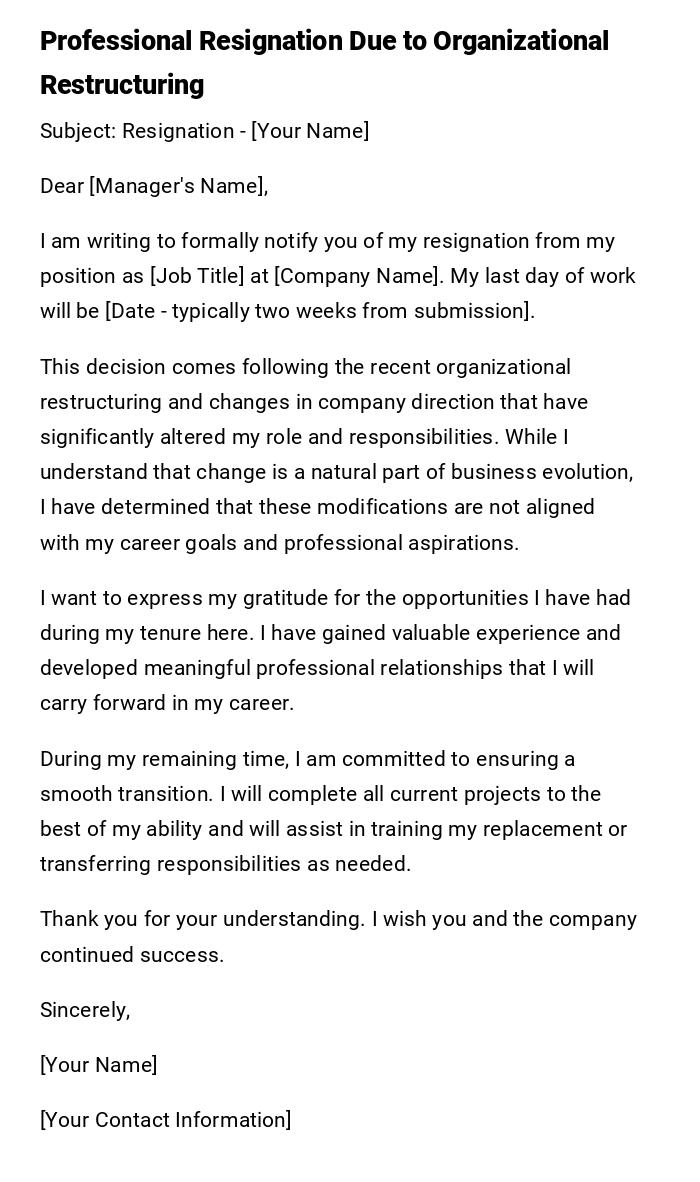
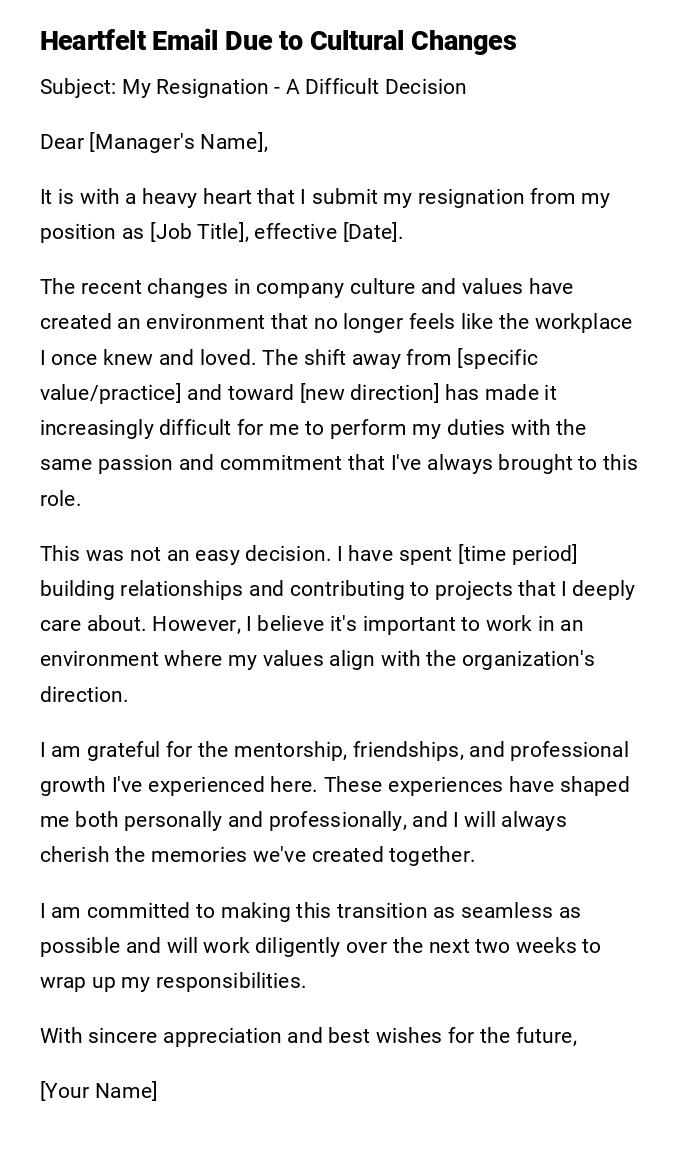
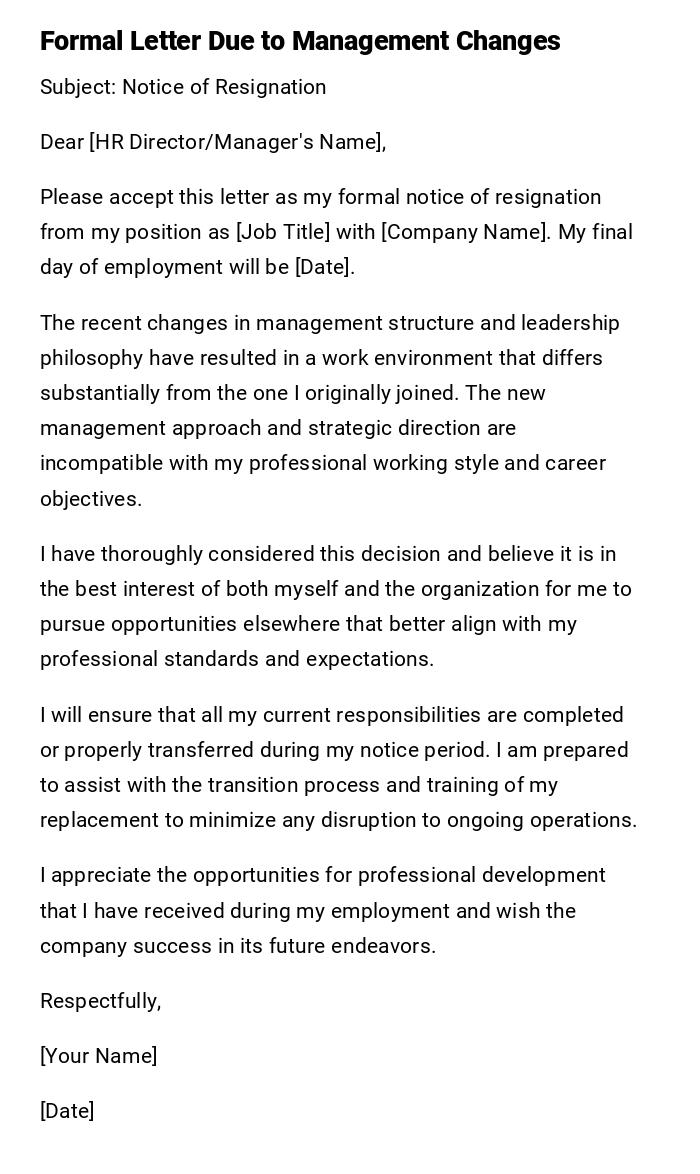
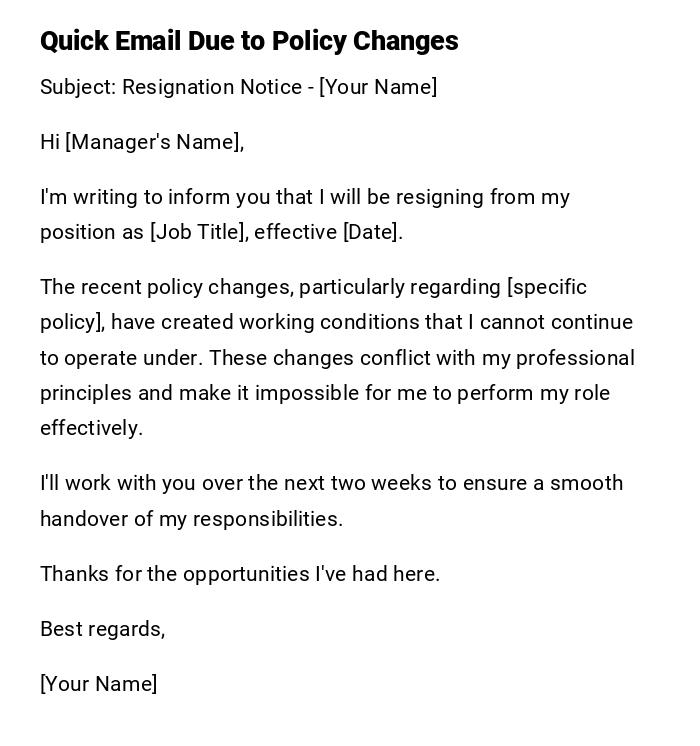
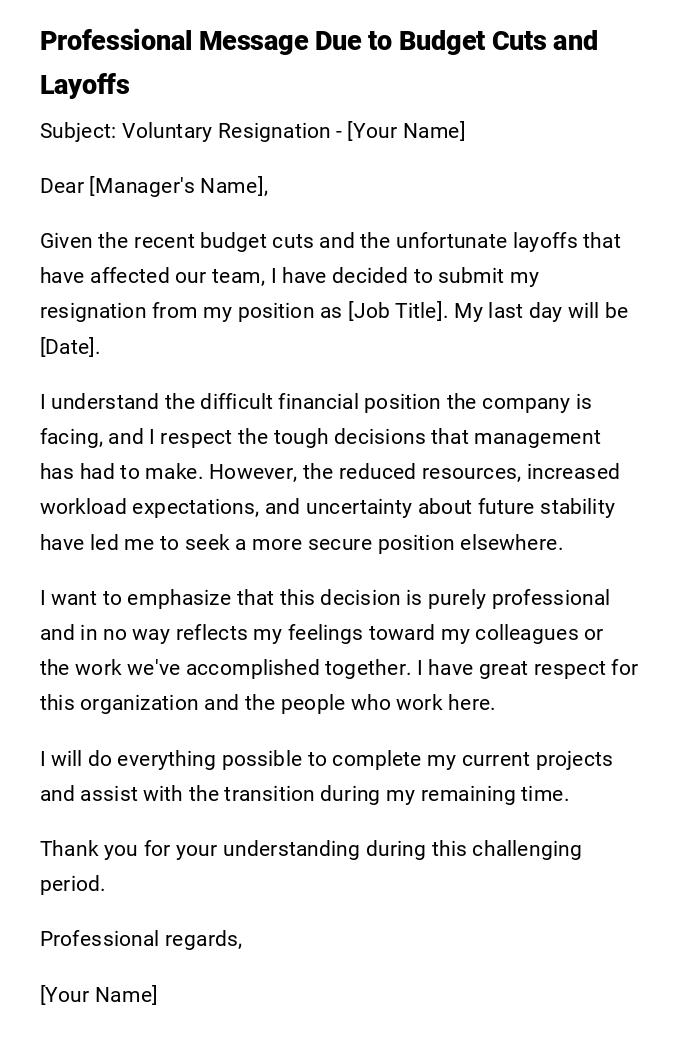
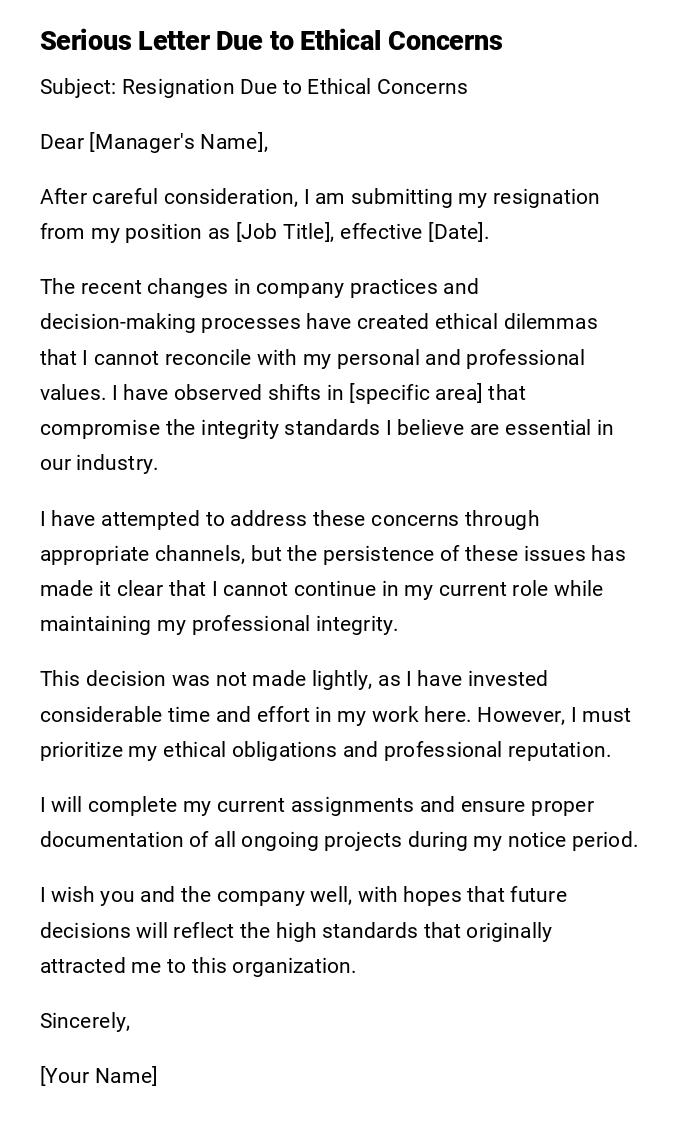
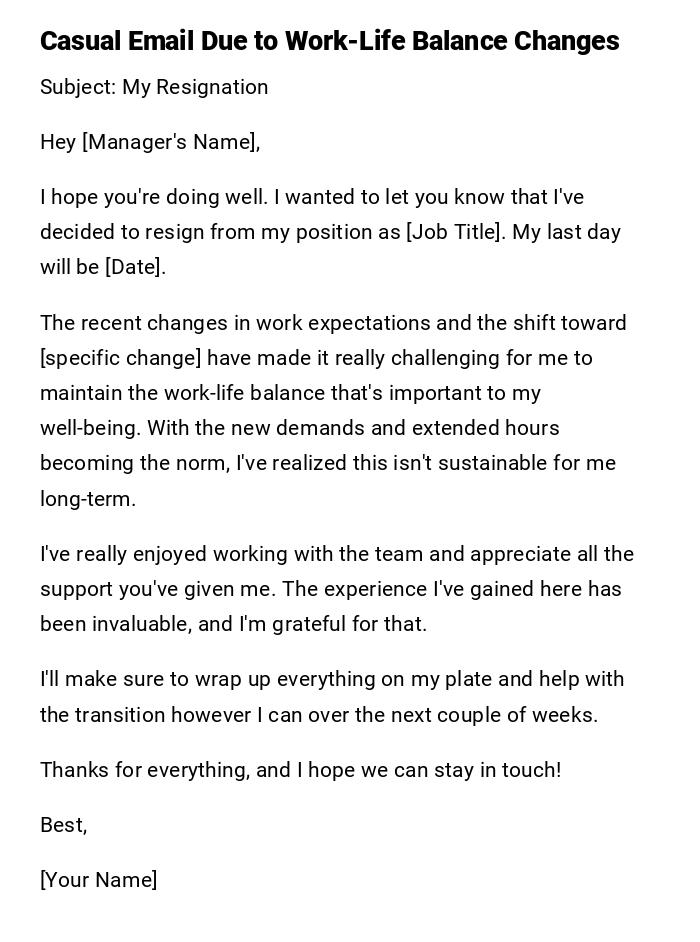

 Download Word Doc
Download Word Doc
 Download PDF
Download PDF